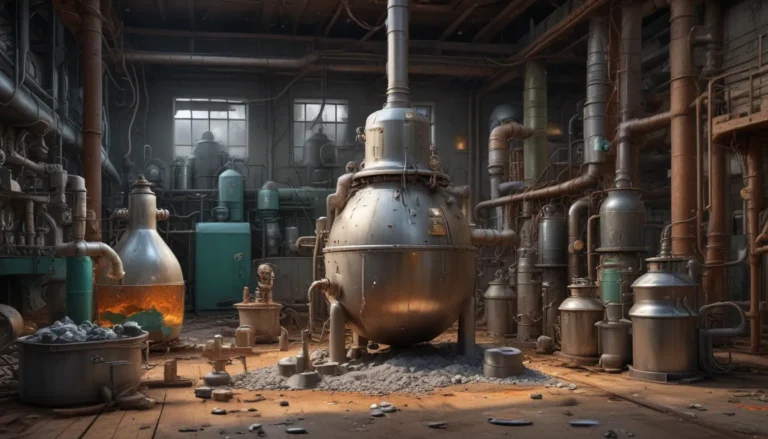A Note About Images: The images used in our articles are for illustration purposes only and may not exactly match the content. They are meant to engage readers, but the text should be relied upon for accurate information.
Metallurgy, the study of metals and their properties, is a captivating field that has shaped civilizations and continues to drive technological progress in various industries. From construction and aerospace to electronics and automotive, metallurgy plays a crucial role in our daily lives. In this article, we will delve into the world of metallurgy and uncover 17 extraordinary facts that highlight the significance and impact of this scientific discipline.
Unveiling the Wonders of Metallurgy
Metallurgy is more than just the study of metals; it is a complex science that explores the properties, extraction, processing, and applications of metals and alloys. The earliest evidence of metallurgy dates back to 6000 BC, showcasing humanity’s ancient connection with metals such as gold, silver, and copper. Iron, one of the most widely used metals in the world, is known for its strength and durability, making it indispensable in various industries.
Metallurgists utilize a range of techniques, including smelting, roasting, and leaching, to extract metals from ore and separate them from their natural compounds. Alloying, the process of combining two or more metals, gives rise to materials with enhanced properties, such as increased strength and resistance to corrosion. Metallurgy is closely linked to materials science and engineering, with researchers collaborating to develop new materials with desired properties.
Metallurgy’s Impact on Industries
Metallurgy has played a vital role in the development of civilizations, driving advancements in tools, weapons, and agricultural equipment. It has revolutionized industries such as aerospace, where lightweight yet strong metals like titanium and aluminum alloys have transformed aircraft design and performance. Metallurgists study the effects of heat treatment on metals, allowing them to modify the microstructure and mechanical properties of metals.
In the field of medical science, biocompatible metals and alloys are used in implants and prosthetics, offering improved functionality and biocompatibility within the human body. Metallurgical engineers work across a range of industries, including automotive, energy, and mining, contributing their expertise to various sectors. Recycling and optimizing the use of metals through metallurgical processes are vital for sustainable development, reducing waste and minimizing environmental impact.
Exploring the Future of Metallurgy
Metallurgy continues to evolve with technological advancements, leading to the development of new alloys, surface coatings, and manufacturing techniques. Understanding the science of metallurgy is crucial in preventing failures in structures, machinery, and critical components. Ancient civilizations such as the Egyptians, Greeks, and Romans were renowned for their metalworking skills, creating intricate ornaments and powerful weaponry.
Training in metallurgy opens up diverse career opportunities in research, development, quality control, and consulting. Metallurgy’s rich history and ongoing innovations underscore its role in shaping human civilization and driving progress in technology and industry. As we explore new frontiers in metallurgy, we can anticipate remarkable discoveries and innovations that will continue to shape our world and drive progress for years to come.
FAQs: Exploring Metallurgy Further
-
What is metallurgy?
Metallurgy is the branch of science and technology that deals with the properties, extraction, processing, and applications of metals and alloys. -
Why is metallurgy important?
Metallurgy is crucial for the production of metals and alloys used in industries such as aerospace, automotive, construction, and electronics. -
What are some common metallurgical processes?
Common metallurgical processes include smelting, refining, casting, forging, welding, and heat treatment. -
What are the advantages of using metals in construction?
Metals offer high strength, durability, and the ability to withstand extreme conditions, making them ideal for constructing buildings and infrastructure. -
Is metallurgy limited to the study of metals?
No, metallurgy also includes the study of alloys, which are mixtures of two or more metals with unique properties. -
How does metallurgy contribute to sustainability?
Metallurgy promotes recycling and efficient use of metals, reducing waste and energy consumption in production processes. -
Can metallurgy have environmental impacts?
Metallurgical processes can have environmental impacts if not properly managed, leading to air and water pollution. -
What are some recent advancements in metallurgy?
Recent advancements include lightweight alloys for aerospace and nanotechnology applications to enhance metal properties. -
Are there health risks associated with working in metallurgy?
Yes, exposure to toxic substances in metallurgy, such as heavy metals and fumes, can pose health risks that require safety measures. -
Can individuals pursue a career in metallurgy?
Individuals can pursue careers in metallurgy by studying materials science and engineering, leading to opportunities in research, development, manufacturing, and quality control.
Embark on a journey through the complexities of metallurgy to gain a deeper understanding of this fascinating field. Each fact reveals a unique perspective on metals and their behaviors, showcasing the incredible properties and applications of metallurgy. As we continue to explore new frontiers in metallurgy, remarkable discoveries and innovations await, shaping our world and driving progress for generations to come.






